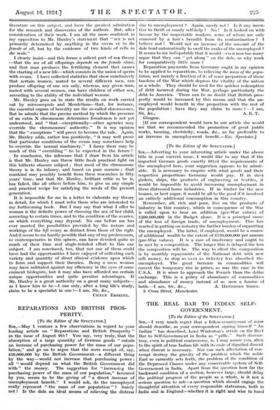[To the Editor of the SPECTATOR.] SIR,—Adverting to your interesting
article under the above title in your current issue, I would like to say that if the imported German goods exactly fitted the requirements of the unemployed here, your suggestion appears to be admir- able. It is necessary to enquire with what goods and their respective proportions Germany would pay. If in steel girders, ships, the products of engineering or textiles, it would be impossible to avoid increasing unemployment in these distressed home industries. If in timber for the new houses, or beet sugar, it would be all to the good if it involved an entirely additional consumption in this country.
Remember, all, rich and poor, live on the products of industry in this country, which in consequence of the War is called upon to bear an addition (pre-War values) of 1200,000,000 in the Budget alone. It is a principal cause of the loss of foreign trade, of unemployment. This has reacted in putting on industry the further burden of supporting the unemployed. The latter, if employed, would be a source of additional wealth to the extent of £150,000,000 per annum (pre-War values). It is a case of insolvency and ought to be met by a composition. The longer this is delayed the less the composition will be. The way to effect the composition is by monthly repayments of the National debt with new soft money, to stop as sa an as industry has absorbed the unemployed. The great increase in commodities will correct the temporary rise in prices, as was the case in the U.S.A. It is wiser to approach the French than the dollar exchange. This is a policy of abundance of commodities and abundance of money instead of as now a famine of


































 Previous page
Previous page